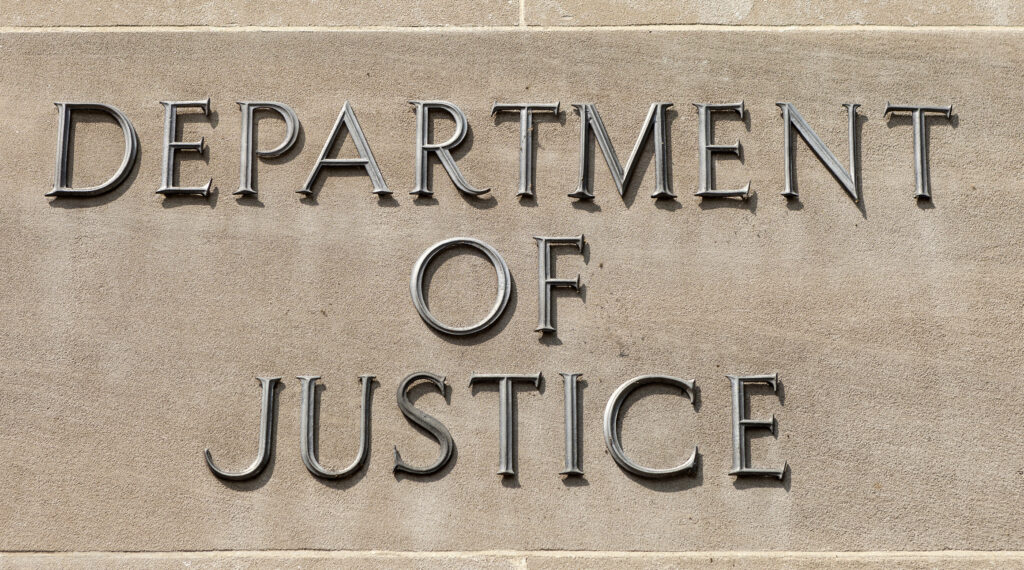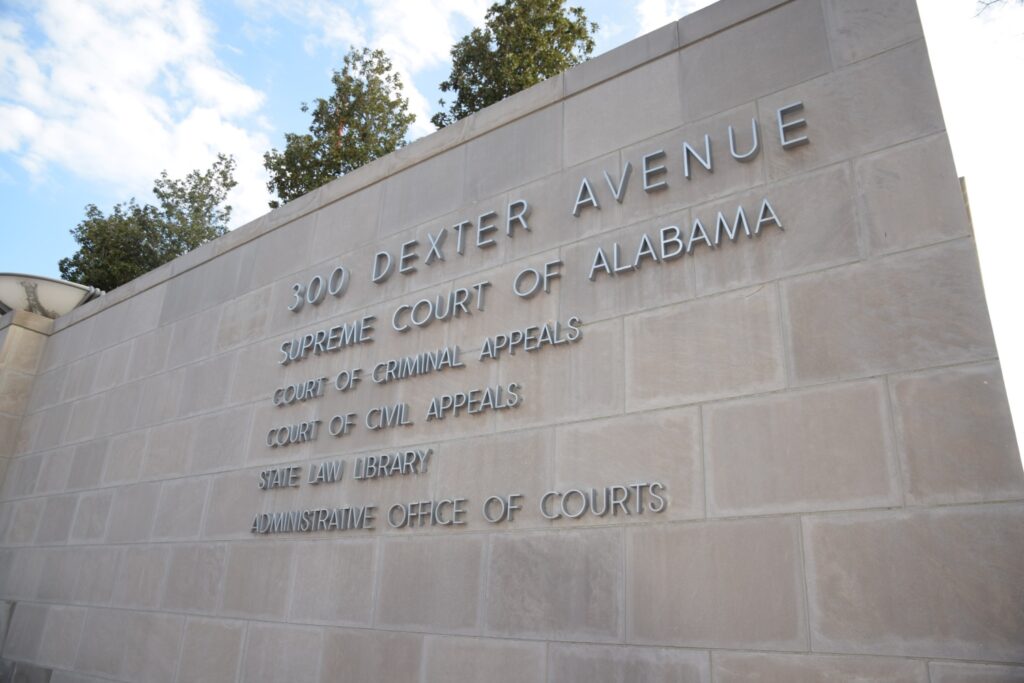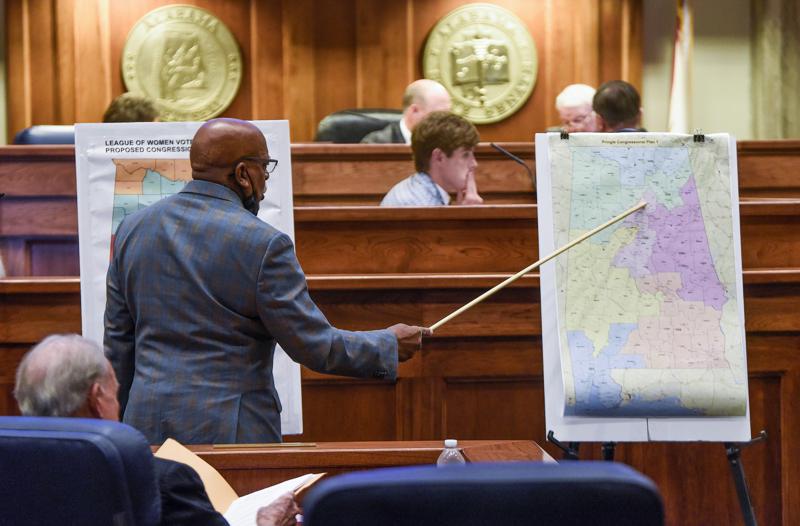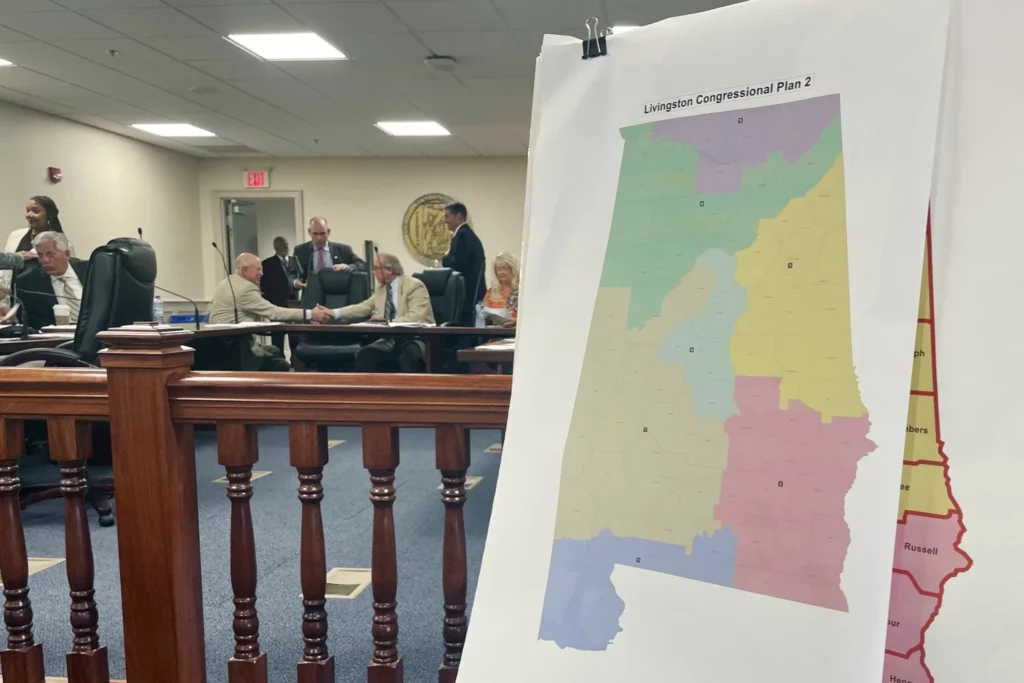U.S. Department of Justice to join suit against AG Steve Marshall’s abortion prosecution threats

by Alander Rocha, Alabama Reflector The U.S. Department of Justice (DOJ) is joining a lawsuit seeking to stop Alabama Attorney General Steve Marshall from prosecuting those who help Alabama women obtain abortion services out of state. In a motion to intervene filed on Thursday, attorneys for DOJ argued that the right to travel between states was a fundamental American right, dating back to the Articles of Confederation. The filing cited a clause of the 14th Amendment in arguing that the right to travel is one of the rights of national citizenship provided by the Constitution. “The right to travel embraces more than just physical movement; it also protects an individual’s right to engage in conduct that is lawful in other states while in those states, regardless of their home state’s laws,” the motion stated. The lawsuit, filed on July 31 by former abortion providers in the state, cited comments made by Marshall in an August 2022 radio interview, where he suggested Alabamians helping people obtain legal abortion care in other states could face felony prosecutions. The lawsuit alleges Marshall’s comments and the threat of prosecution forced healthcare providers to cease providing critical information, counseling, and practical support to Alabamians exercising their constitutional right to access medical care across state lines. After the lawsuit was filed, Marshall renewed his threats to prosecute out-of-state abortion care. U.S. District Judge Myron Thompson postponed a hearing set for Oct. 31, and the hearing has not been rescheduled. The DOJ motion Thursday argued that states lack the authority to prohibit travel across state lines and can’t prevent third parties from helping individuals seek an abortion out-of-state. “The Alabama AG cannot undermine the right to travel by making each traveling individual an island unto themselves, prohibited from receiving assistance from anyone else within the state,” attorneys for DOJ wrote. Health care providers sue Alabama officials over threats of prosecution in abortion aid The motion further argued that the United States and its federal agencies have an interest in states not criminalizing travel, or the assistance of travel, across state lines to access healthcare. “The United States has a sovereign interest in preserving the proper functioning of the federal system, including by ensuring that one state does not improperly intrude into the affairs of other states, thereby protecting the integrity of the Union itself,” the motion stated. The motion also referenced Supreme Court Justice Brett Kavanaugh’s opinion in Dobbs v. Jackson Women’s Health Organization, the 2022 ruling that struck down the right to abortion. “As Justice Kavanaugh has explained, the question of whether a State may ‘bar a resident of that State from traveling to another State to obtain an abortion’ is ‘not especially difficult’ — ‘the answer is ‘no’ based on the constitutional right to interstate travel,’” according to the motion. The motion also argued that the state does not have the right to prevent organizations or individuals from providing help for out-of-state abortion care, noting that the Supreme Court has ruled that helping people travel is equally protected. When a state prevents third-party assistance for travel, the motion argued, it violates that right to travel. If restrictions were allowed for conduct that the state prohibits, that could open the door to “problematic state laws.” “A state that criminalized gambling could go further and prevent its residents from assisting with travel to casinos in Mississippi or Nevada, based solely on its policy disagreement with those states on that issue,” the motion said. The attorney general’s office had not responded to the motion as of Thursday evening. Alabama Reflector is part of States Newsroom, a network of news bureaus supported by grants and a coalition of donors as a 501c(3) public charity. Alabama Reflector maintains editorial independence. Follow Alabama Reflector on Facebook and Twitter.
Alabama Supreme Court gives go ahead for execution by nitrogen hypoxia

Ralph Chapoco, Alabama Reflector Alabama is one step closer to becoming the first state to execute someone by nitrogen hypoxia. In a 6-2 decision handed down Wednesday, the Alabama Supreme Court allowed the state to proceed with the execution of Kenneth Eugene Smith, convicted of the 1988 murder of Elizabeth Sennett, under that method. Alabama Attorney General Steve Marshall said in a statement Wednesday that Sennett’s family had “waited an unconscionable 35 years to see justice served.” “Though the wait has been far too long, I am grateful that our talented capital litigators have nearly gotten this case to the finish line,” the statement said. Chief Justice Tom Parker and Associate Justice Greg Cook dissented but gave no additional comment. Nitrogen hypoxia has never been used on a human being as a means of execution, and professional veterinary associations have discouraged its use in the euthanization of animals. Smith’s attorneys said in a statement Thursday that they were disappointed in the decision and would continue to work through the judicial process. Smith currently has an appeal pending with the Alabama Court of Criminal Appeals claiming that attempting to execute him a second time violates his constitutional rights. “It is noteworthy that two justices dissented from this Order,” wrote Robert Grass, an attorney for Smith. “Like the eleven jurors who did not believe Mr. Smith should be executed, we remain hopeful that those who review this case will see that a second attempt to execute Mr. Smith – this time with an experimental, never-before-used method and with a protocol that has never been fully disclosed to him or his counsel – is unwarranted and unjust.” The order gives the Alabama Department of Corrections the authority to carry out Smith’s execution within the time frame set by Gov. Kay Ivey, which cannot happen less than 30 days from Wednesday, when the court published its decision. The Attorney General’s Office filed a motion with the Alabama Supreme Court back in August, requesting the court set a date for Smith’s execution. Smith’s attorneys requested the court reject the state’s motion in September, stating that nitrogen hypoxia has not been tested and only recently released the protocol for using that method of execution. A jury convicted Smith in 1996 in the plot to murder Sennett and voted to sentence him to life without the possibility of parole. The judge in the case overrode the jury recommendation and sentenced Smith to death. Alabama abolished judicial override in 2017, the last state in the country to do so. But the rule was not made retroactive. In May the U.S. Supreme Court upheld a lower court’s decision that allowed him to select his method of execution, in this case is death by nitrogen hypoxia. The high court turned down the appeal by the Alabama Department of Corrections, which argued that Smith was pursuing a delaying tactic. Smith was scheduled to be executed in November following the botched executions of Joe Nathan James Jr. and Alan Miller. However, his execution was called off after ADOC staff repeatedly failed to secure a vein to carry out the execution. Smith’s attorneys wrote in a brief last January that he “continues to experience physical and emotional pain, including lingering pain in his arm, near his collarbone, back spasms, difficulty sleeping, and likely post-traumatic stress disorder” from the failed execution. Death through nitrogen hypoxia became an available method for executing people on death row after the Legislature passed a bill sponsored by Sen. Trip Pittman, R-Montrose, allowing its use. He said that the method was more humane than lethal injection. Doctors and medical ethicists have criticized those claims. “Last year, after Alabama tortured multiple people in botched executions using lethal injection, we encouraged the state to pursue an independent evaluation of its execution protocols,” said Alison Mollman, interim legal director of the ACLU of Alabama. “Governor Ivey and the Alabama Department of Corrections failed to complete an independent review and instead insisted the problem was not having enough time to kill someone. Now, at the urging of Attorney General Steve Marshall, Alabama is rushing to put a man to death with an untested, unproven, and never-before-used method of execution. As Alabama races to experiment on incarcerated people with nitrogen gas, they put the lives of correctional staff, spiritual advisers, the media, and victims at risk by potentially exposing them to an odorless and lethal gas. Using this method has no benefit on public safety. Governor Ivey and Attorney General Marshall have a responsibility to stop the execution of Mr. Smith.” The Death Penalty Information Center, a nonprofit that students and collects data on the death penalty, criticized Alabama’s move toward nitrogen executions in a statement on Thursday. “No state has ever used nitrogen in an execution, and there are still too many unanswered questions for Alabama officials to responsibly move forward with this protocol,” the statement said. “Mr. Smith has already endured one botched execution; he should not now face another attempt that carries this much risk and uncertainty.” Alabama Reflector is part of States Newsroom, a network of news bureaus supported by grants and a coalition of donors as a 501c(3) public charity. Alabama Reflector maintains editorial independence. Follow Alabama Reflector on Facebook and Twitter.
AG Steve Marshall hosts 24th annual law enforcement summit

On Tuesday, Alabama Attorney General Steve Marshall (R) hosted the 24th Annual Attorney General’s Law Enforcement Summit at the Church of the Highlands in Montgomery. The Summit provided continuing education training for law enforcement and attorneys from around the state. This year’s participants had the opportunity to hear from experts involved in the nationally recognized Murdaugh murder case in South Carolina, receive training on the Alabama Criminal Enterprise Prevention Act, and participate in a memorial recognizing fallen officers. “Our men and women in blue sacrifice so much for our safety on a daily basis, and I will never stop working to provide law enforcement with the training, resources, and tools they need to confront the variety of challenges that they face while protecting our communities,” said AG Marshall. “Crime does not know borders, and this annual event is an opportunity for law enforcement professionals from across the state to interact, connect, and potentially collaborate.” This year’s training highlighted the successful legislative session in which Attorney General Marshall worked with the Alabama legislature to fix what he considered to be fatal flaws in our criminal justice system and provide critical tools for our law enforcement. The keynote speaker for the event was Dr. Kenneth Kinsey, the Chief Deputy for the Orangeburg County Sheriff’s Office. Dr. Kinsey discussed the widely covered Murdaugh murder trial and conviction in South Carolina. Between training, Marshall held a memorial for the three fallen officers who lost their lives in the line of duty last year. The fallen officers commemorated were Huntsville Police Officer Garrett Crumby, Alabama Port Authority Police Officer Kimberly Sickafoose, and Montgomery Police Department Officer Carlos Taylor. Officer Crumby died on March 28, 2023, after being shot while responding to a shots fired call. Officer Crumby was a member of the Huntsville Police Department for three years and previously served with the Tuscaloosa Police Department for eight years. He is survived by his wife, mother, father, and three sisters. Port Officer Sickafoose died on May 11, 2023, after her patrol truck submerged in the Mobile River while on patrol. Officer Sickafoose served with the Alabama Port Authority Police Department for seven years. She had previously served as the police chief of the Silverhill Police Department. She is survived by her daughter and sister. Officer Taylor died on June 30, 2023, after he succumbed to complications from injuries sustained in an on-duty vehicle crash in February 2017 while responding to a call for assistance in a vehicle pursuit. As a consequence of the crash, Officer Taylor suffered a traumatic brain injury that resulted in him being a quadriplegic. He served the Montgomery Police Department for two years. Attorney General Marshall stated, “Law enforcement in Alabama is truly a family, sharing a deep commitment to our communities and to each other. The Summit brings us together for more than just trainings, but for fellowship with one another and to honor and remember our brothers and sisters who have lost their lives.” Marshall was a long-time district attorney before he became attorney general. To connect with the author of this story or to comment, email brandonmreporter@gmail.com.
Judge dismisses Birmingham Southern College lawsuit

On Tuesday, Montgomery Circuit Judge James Anderson dismissed the lawsuit brought by Birmingham Southern College (BSC) to force State Treasurer Young Boozer (R) to give the troubled college a bridge loan to allow the private college to stay open. In this past legislative regular session, the Legislature approved controversial legislation to help BSC. The Distressed Institutions of Higher Learning Revolving Loan Fund Act, passed by the Legislature and signed by Alabama Governor Kay Ivey (R), empowered the State Treasurer to loan money to failing private colleges. Boozer had the power to give BSC the money, but after evaluating BSC’s financial viability, Boozer concluded that there was little chance that BSC would ever be able to pay the state back. BSC responded by suing Boozer, arguing that the legislative intent of the legislation was to give the school the money. Alabama Attorney General Steve Marshall (R) asked that the court dismiss the lawsuit. Judge Anderson agreed with the state’s arguments. Daniel Coleman is the President of BSC. “We are disappointed with this ruling and are exploring our options, which may include an appeal to the Alabama Supreme Court with a request for an expedited briefing,” said BSC President Coleman in a statement. “While the Alabama Constitution provides for immunity to state officials, such immunity should not apply to those who act arbitrarily or capriciously, or in bad faith, or who have misinterpreted the law in question.” “Our good faith was betrayed over the several months of working with Treasurer Boozer to deliver this bridge loan to the College,” Coleman added. “The timeline of our interactions clearly demonstrates that his behavior was arbitrary and capricious. We also believe he is misinterpreting the language of the Act pertaining to collateral.” The legislation allowed Boozer to give BSC a $30 million lifeline, providing the College with operating funds for three years. BSC claimed that during those three years, it could raise an endowment of up to $200 million to ensure its long-term financial stability. BSC likely would have closed in the spring of 2023 if not for the passage of the controversial bridge loan legislation. In a letter dated October 13, Boozer notified BSC that their loan application had been denied; the letter arrived on October 18. BSC claimed that during months of discussions, Boozer gave them no indication that any aspect of BSC’s application was incorrect or that he would not act as the Legislature intended, Coleman said. Coleman claims that Boozer has provided inconsistent reasons for his denial. Judge Anderson ruled that the legislation gives Boozer discretion over who he grants a loan to and was within his rights to deny the loan. Anderson said he sympathizes with the college. However, given the Legislature’s language, past precedent, and sovereign immunity, BSC has no case. Thus, he granted Marshall’s motion to dismiss. BSC, which has been declining for decades, has been hemorrhaging students in recent years and is reportedly down to just 731 students, while the college still has 284 employees. The college decided to stay open for the fall semester pending receiving the money from the state’s loan. At this point, however, it appears that the college will have to close soon, perhaps as soon as the end of the current semester. BSC had initially asked the Legislature and local government for a cash bailout. That request was rejected, but BSC alum State Senator Jabo Waggoner (R-Vestavia Hills) sponsored the Distressed Institutions of Financial Learning Revolving Loan Fund Act to save the failing liberal arts college. The closing of a private college is not without precedent in Alabama. Judson College, the state’s only women’s college, closed four years ago when its income could not meet its liabilities. To connect with the author of this story or to comment, email brandonmreporter@gmail.com.
Heather Moore addresses Montgomery GOP

Heather Moore – the wife of Congressman Barry Moore (R-ALO4), was the keynote speaker on Thursday at the Montgomery County Republican Party’s annual Lincoln – Reagan dinner. Approximately 150 Republicans, including several dignitaries, were in attendance on the sixth floor of the RSA Plaza Building next to the Alabama State House for the annual event. “I love politics,” Heather said. “When Barry was in the State House, I would drive up for the day to watch the action on the floor and drive home before the kids got home.” Heather reminisced that once the State Legislature voted to extend unemployment benefits in the wake of the Great Recession, and one member of the House voted no on extending those benefits. Heather was sitting in the gallery with her friend, Bill Goolsby – who was also in attendance on Thursday. “Who is the one idiot who voted no?” Heather asked Goolsby. “That would be your husband,” Goolsby replied. Heather texted Barry, “You voted the wrong way,” but Barry could not be swayed from his stance. “That was the day that Barry was the one no vote to extend unemployment benefits.” Barry Moore has been an outspoken supporter of Jim Jordan (R-Ohio) as the next House Speaker. “Jim and Polly Jordan have become great friends,” Heather said. Bill Harris, Moore’s district director, said that Congressman Moore wanted to attend but could not because of the open Speaker of the House race and the possibility that there could have been a vote that night. Barry Moore is in his second term representing Alabama’s Second Congressional District. “We are $33 trillion in debt,” Rep. Barry Moore told the Montgomery GOP in a taped statement. “Inflation is up. Gas prices are rising.” Rep. Moore accused the Biden Administration of illegally giving “billions of dollars to Ukraine while 53% of Americans are living paycheck to paycheck.” Moore said that spending has soared since 1997 because Congress has failed to do its job by passing appropriations through normal order by using 12 spending bills. “The House has already passed several of these appropriations bills, but we are on a short notice to finish the rest and send them to the Senate,” Congressman Moore said. Moore said that Heather is “my favorite teammate of 31 years.” Harris said that Moore said of Heather, “She would have written my speech anyway, so I might as well send her.” Heather Moore grew up in the Sand Mountain area of Dekalb County. “I came from a very political family on my mother’s side,” Heather said, “My granddaddy was a farmer and a cotton broker. He was a Republican and a staunch supporter of Ronald Reagan.” “We are Appalachians, so we all live a quarter mile from each other, so my grandparents had a great role in my upbringing,” Heather said. “My dad’s side of the family were all yellow dog Democrats,” Heather said. “Staunch Republicans and the other side were yellow dog Democrats. I realized that the Republican side was always the happy side while the Democrat side was always mad.” “I was a huge Ronald Reagan fan,” Heather said. “I remember going to Donald Trump’s inauguration.” Heather Moore said that originally, she was not impressed with Barry Moore, but that position changed. “I did say that I would not go out with Barry Moore if he was the last man on Earth. I married him ten months later,” Mrs. Moore recounted. “We started our small business in Enterprise,” Heather said. “Barry never had any intention of getting involved in politics, but I did. I joined the Coffee County Republican Executive Committee.” Heather continued, “In 2006, some of our friends said your husband should run. Barry wouldn’t hear it. In 2008 (Barack) Obama was elected and said we are not a Christian nation, but a nation of citizens.” That is when Barry Moore became interested in running. He ran and was elected to the Alabama House of Representatives in 2010. “Barry is a horrible politician,” Heather said. “He is terrible at it. Barry is going to say what he believes. There is one Barry.” “Who thought three years ago that we could fall so far,” Heather said. “In 2020, Barry was running for Congress, and we thought Donald Trump was going to be President, and we were going to get so much done.” While Barry Moore was elected, Donald J. Trump was defeated by Joe Biden, and Republicans lost control of both Houses of Congress. The GOP gained limited control of the House of Representatives in 2022. “Barry is the eternal optimist,” Heather said. “He says that everything is going to be OK. I had to tell him, ‘No, Barry, things are not going to be OK.’” “It has been one crisis after another,” Heather said. “Back in the good ole days, it was Democrat versus Republicans. Now, it is not. It is normal versus crazy. It’s crazy versus normal. That is what we are having to fight as a nation.” Barry Moore’s Second Congressional District was recently redrawn along racial lines by a federal three-judge panel, making it highly likely that a Democrat will win Congressional District 2. The Moores’ Coffee County was drawn into Congressman Jerry Carl’s (R-Mobile) First Congressional District, potentially pitting the two GOP incumbents against each other. “The states have the right to choose their federal representative,” Heather said. “That is what the Constitution says. The Constitution of Alabama says that the Legislature draws those maps. I pray that Steve Marshall fights this all the way to the Supreme Court.” “He has loved every county in this district,” Heather said of Barry. “We represent every county. Barry has loved on every county, and some of those counties are Black.” “When you call our office, we don’t ask what color you are,” Heather said. “We don’t ask if you are a Republican or Democrat. We ask how can we help you.” “I don’t care what skin color my Congressman, or my President, is as long as they represent me with Republican values,” Heather said. “Read the Bible – read the Old Testament. There were evil kings in the Bible,” Heather said. “We are
AG Steve Marshall announces conviction of former state legislator David Cole

On Tuesday, Attorney General Steve Marshall announced the conviction of former Alabama State Representative David Cole, who was ordered to pay $52,885.79 in restitution to the State General Fund and serve 60 days in the Madison County Jail. Cole also resigned his legislative seat, which was vacated upon his arrest in August. Cole must turn himself in by October 17, 2023, at 5:00 p.m. Cole resigned from office in August and signed a plea deal admitting guilt. Cole was arrested for voter fraud, having voted at an unauthorized location or location. Cole, 52, of Madison, served as the representative for House District 10 from November 2022 until August 2023. Today, Cole pleaded guilty as a part of a plea agreement, and Madison County Circuit Court Judge Mann adopted the terms of the agreement. Cole, a Madison County resident, decided in the summer of 2021 to seek election to the Alabama House of Representatives. Due to redistricting, he anticipated that his Cedar Springs residence would be drawn into another district outside of House District 10. In mid-October 2021, Cole asked a third party for a leased location “to sleep in” in case he could not find another home or apartment within the newly redrawn house district. In November 2021, Cole signed a lease requiring him to pay $5 per month for a “5×5 area.” He then certified his “new residence” via an online voter registration update with the Alabama Secretary of State. The evidence in this case reflects that Cole never made any attempt to move into the home, nor did he ever eat or sleep in the leased space. In the May 2022 primary election in which Cole was a candidate, Cole voted absentee using the leased address and later voted in-person for the June run-off election, where he was not authorized to vote. In the weeks before the primary election, and in response to media questions about his residency, Cole provided an altered copy of his lease which specified that Cole was renting the “house” rather than a “5 x 5 area.” Cole also provided another lease for an apartment he obtained on or about September 1, 2022. Cole completed another online voter registration update on October 17, 2022, in which he certified that he resided at that apartment, and then voted in the general election in November 2022 at a polling place in which he was not authorized to vote. Only weeks later, Cole completed a property-tax exemption document in which he certified that as of October 1, 2022, he resided in the Cedar Springs house. A special election for this seat will be held on December 12, 2023.
Paul DeMarco: ACLU attacks Alabama Parole Board at the expense of crime victims

No one should be surprised that the Alabama ACLU is at it again. This time, the far-left organization is attacking the work of the Alabama Board of Pardons and Paroles. The ACLU is just another liberal group that puts the interest of felons convicted of violent crimes above victims and insists that these inmates must be released on Alabama streets, although they could endanger the public. The ACLU is out with a new report critical of the Parole Board for not releasing more inmates from state prisons. Part of ACLU’s criticism is that the Parole Board actually heeds the opposition of the Alabama Attorney General’s Office and crime victims. It just shows how out of touch the ACLU is with Alabama citizens that the group actually criticized the Board for taking into strong consideration the input of Attorney General Steve Marshall, victims, and the victim advocacy group VOCAL. Their other concern is that Parole Board Chair Leigh Gwathney actually looks at each parole request on a case-by-case basis and will not release anyone she feels will be a danger to Alabama citizens. Thank goodness the Chair is doing her job in actually looking at the facts and circumstances of each case and not rubber-stamping a result. She is to be praised for listening to those impacted by crime and the state’s top prosecutor. Although intended to have the opposite effect, the report from the ACLU, in reality, actually spotlights what an effective job Gwathney is doing as Chair of the Board. The ACLU makes the same tired arguments that not enough of those incarcerated in Alabama prisons are being released. When critics denounce the number of paroles being granted, they often ignore the many factors the Parole Board considers, including what environment might the inmate be released into. Does the offender have a “home plan” and work already lined up? Who will help hold them accountable, or will the inmate return to the same circle of “friends” they were with when they committed their crime? The ACLU also argues that the Parole Board should release inmates who are currently in ADOC’s work release program, indicating that these individuals must be low-risk. But, the supervision levels of work release and parole are vastly different. Further, how long a particular inmate has been in work release could be a factor; maybe the Parole Board wants the offender to demonstrate success in that structured environment for a longer period. Simply being in ADOC’s work release program should not be seen as a qualifier for parole, especially since news headlines often tell of Alabama inmates who have escaped from work release. Additionally, ACLU’s report indicates that “Alabama’s parole grant rate has dropped to historic lows,” but they’re comparing today’s number of paroles granted to the recklessness of the Parole Board in 2017-18 when more than 50 percent of paroles were approved (and more than 80 percent of Alabama’s inmates are incarcerated for violent crimes). While public safety is paramount, we cannot ignore that “justice” is another important goal of incarceration. In a recent press release, the ACLU demanded, “It is time for incarcerated Alabamians to come home.” Unfortunately, the families of murder victims will never see their deceased loved ones “come home.” Alabama citizens should demand that their state representatives and senators finally enact truth-in-sentencing legislation. A few years ago, the Alabama Legislature had to make significant reforms due to the failures of the prior Parole Board, whose actions led to the release of a parolee who then murdered three people in Marshall County. However, now that the Board is professionally run, these progressive groups are on the attack, howling the injustice that inmates actually serve the sentences they were given. State leaders need to heed their most important responsibility and always put public safety first. Paul DeMarco is a former member of the Alabama House of Representatives and can be found on X (formerly Twitter) @Paul_DeMarco.
Alabama to receive $1.6 million in data breach settlement

Last week, Alabama Attorney General Steve Marshall announced a 49-state settlement with software company Blackbaud for its deficient data security practices and response to a 2020 data breach that exposed the personal information of millions of consumers across the United States. Under the settlement, Blackbaud has agreed to overhaul its data security and breach notification practices and make a $49.5 million payment to the states. Alabama will receive $1.6 million from the settlement. “Data breaches are becoming far too common as well-known tech companies are facing major security breaches that directly impact businesses, organizations and ultimately, consumers,” Marshall said in a press release. “While we constantly urge consumers to be vigilant with how and when they provide personal information, companies also need to take a serious look at their technology defenses. Consumers should feel confident when making a payment, donation, or providing sensitive personal information that their personal information will not end up on the dark web.” Blackbaud provides software to various nonprofit organizations, including charities, higher education institutions, K-12 schools, healthcare organizations, religious organizations, and cultural organizations. Blackbaud’s customers use Blackbaud’s software to connect with donors and manage data about their constituents, including contact and demographic information, Social Security numbers, driver’s license numbers, financial information, employment and wealth information, donation history, and protected health information. This type of highly sensitive information was exposed during the 2020 data breach, which impacted over 13,000 Blackbaud customers and their respective consumer constituents. The settlement resolves allegations that Blackbaud violated state consumer protection laws, breach notification laws, and HIPAA by failing to implement reasonable data security programs and remediate known security gaps, which allowed unauthorized persons to gain access to Blackbaud’s network, and then failing to provide its customers with timely, complete, or accurate information regarding the breach, as required by law. As a result of Blackbaud’s actions, notification to the consumers whose personal information was exposed was significantly delayed or never occurred at all insofar as Blackbaud downplayed the incident and led its customers to believe that notification was not required. Under the settlement, Blackbaud has agreed to strengthen its data security and breach notification practices going forward, including: Indiana and Vermont co-led the multistate investigation, assisted by the Executive Committee consisting of Alabama, Arizona, Florida, Illinois, and New York, and joined by Alaska, Arkansas, Colorado, Connecticut, Delaware, District of Columbia, Georgia, Hawaii, Idaho, Iowa, Kansas, Kentucky, Louisiana, Maine, Maryland, Massachusetts, Michigan, Minnesota, Mississippi, Missouri, Montana, Nebraska, Nevada, New Hampshire, New Jersey, New Mexico, North Carolina, North Dakota, Ohio, Oklahoma, Oregon, Pennsylvania, Rhode Island, South Carolina, South Dakota, Tennessee, Texas, Utah, Virginia, Washington, West Virginia, Wisconsin, and Wyoming. The Securities and Exchange Commission (SEC) charged the company for making misleading disclosures concerning the data breach. In March, the SEC announced that the company had agreed to pay $3 million to settle the charges. “As the order finds, Blackbaud failed to disclose the full impact of a ransomware attack despite its personnel learning that its earlier public statements about the attack were erroneous,” said David Hirsch, Chief of the SEC Enforcement Division’s Crypto Assets and Cyber Unit. “Public companies have an obligation to provide their investors with accurate and timely material information; Blackbaud failed to do so.”
Wes Allen says legal portion of redistricting process is not completed

On Thursday, the three-judge panel announced Alabama’s new congressional district map they selected for the state. Alabama Secretary of State Wes Allen responded to the three-judge panel’s selection of map number three. Map three partitions the Wiregrass, Mobile County, and even Mobile City. Map one, also partitioning Houston County, had been the most popular among the plaintiffs, while two was the least popular choice. The State of Alabama opposed all three of the maps. Allen and Attorney General Steve Marshall have vowed to continue to appeal. “The Office of the Secretary of State will facilitate the 2024 election cycle in accordance with the map the federal court has forced upon Alabama and ordered us to use,” said Allen. “It is important for all Alabamians to know that the legal portion of this process has not yet been completed. A full hearing on the redistricting issue will take place in the future, and I trust Attorney General Marshall to represent Alabama through that process. In the meantime, I will keep our state’s elections safe, secure, and transparent because that is what I was elected to do.” The three-judge panel ruled that the map passed in the July 2023 special session did not allow Alabama’s Black minority to select their own representative, thus violating the Voting Rights Act of 1965. The three-judge panel then appointed Richard Allen as a special master to draw new maps. The three maps all radically redrew the First and Second Congressional Districts. Republican incumbent Congressmen Jerry Carl and Barry Moore both now live in Congressional District One. Carl has announced that he will run for reelection. Moore, on the other hand, has said that he is going to wait before deciding on his future plans. The three-judge panel ordered that the maps be redrawn so that two of the seven congressional districts are majority-minority districts “or something close to it.” The Legislature refused to draw a map that complied with the court’s order, resulting in the court rejecting the state legislature’s map. The state has appealed to the U.S. Supreme Court; however, both the three-judge panel and the Supreme Court have refused to stay the court-ordered redistricting while the state appeals the ruling of the lower court, citing their belief that the state is unlikely to prevail in its appeal. Thursday’s announcement brings clarity for voters and candidates. Democratic qualifying began last Friday, while Republican qualifying does not begin until October 16. The major party primary will be on March 5. To connect with the author of this story or to comment, email brandonmreporter@gmail.com.
Three judge panel will rule on Alabama’s congressional districts soon

On Tuesday, the three-judge panel hearing the Alabama Congressional redistricting case listened to arguments for and against the three maps prepared by the special master, Richard Allen. The court held an 80-minute hearing at the federal courthouse in Birmingham on Tuesday. The three-judge panel includes U.S. Circuit Judge Stanley Marcus, federal District Judge Anna Manasco, and federal District Judge Terry Moorer. Plaintiffs tended to prefer map 1, which divides Houston County and includes the City of Dothan into Congressional District 2. The Alabama Attorney General’s office has objected to this entire process and has vowed to defend the July 2023 redistricting map prepared by the state Legislature. The court previously rejected a motion by Alabama Attorney General Steve Marshall to stay the proceeding while the State appeals. The U.S. Supreme Court has also rejected Marshall’s request for a stay. Incumbents Republican Congressmen Jerry Carl and Barry Moore both now live in the First Congressional District. All three maps divide Mobile County. In June, the three-judge panel ordered the Legislature to pass a new congressional redistricting map to include two majority-minority districts “or something close to it.” The Legislature refused and instead defied the court’s authority by passing their own map that kept White majorities in six of Alabama’s seven congressional districts. In August, the three-judge panel rejected the Legislature’s plan as having violated the Voting Rights Act of 1965. The court rejected the state’s map and appointed Allen to draw new maps. The federal courts have already ruled that the state’s 2021 congressional rezoning likely violated section two of the Voting Rights Act of 1965. Secretary of State Wes Allen has told the courts that the state needs to know which map is chosen due to the quickly approaching 2024 election cycle. Democratic candidate qualifying has already opened, and Republican candidate qualifying opens on October 16. The major party primaries will both be held on March 5. To connect with the author of this story or to comment, email brandonmreporter@gmail.com.
Three judge panel to meet today to consider Alabama congressional maps

On Tuesday, a federal three-judge panel will meet to consider three Alabama congressional redistricting maps drawn by the court-appointed special master Richard Allen. The court appointed Allen after rejecting a map drawn by the Alabama Legislature in a July special session, which the judge said violates Section 2 of the Voting Rights Act of 1965. The court rejected a motion by Alabama Attorney General Steve Marshall to stay the proceeding while the State appeals. The U.S. Supreme Court has also rejected Marshall’s request for a stay. The three maps dramatically redraw Alabama’s Congressional Districts 1 and 2, putting Republican incumbents Jerry Carl and Barry Moore in the same districts. In the three plans, Congressional District 2 could have between 48.7% Black voters and 50.1%, depending on which plan the court approves. “We have an opportunity to elect a 2nd Democrat to the U.S. House, win state races, and re-elect President [Joe] Biden so that he may complete his historic agenda,” Alabama Democratic Party Chairman Randy Kelley said. “Alabama has benefited greatly from President Biden’s policies, including the Bipartisan Infrastructure Law, with over $3.2 billion allocated for roads, bridges, high-speed internet, and other major projects. We will do our part by winning seats for local, state, and national offices.” If one of these three maps is adopted, given the fact that over 80% of White Alabamians vote Republican and over 90% of Black Alabamians vote Democratic, this means that Democrats have a likely chance of winning Congressional District 2 in the 2024 election. The three maps comply with the three-judge panel’s order that the congressional redistricting map includes two majority-minority districts “or something close to it.” In 2021, the Alabama Legislature passed congressional redistricting that closely followed the existing seven congressional districts, which included one majority-minority district – the Seventh Congressional District. In 2022, the three-judge panel declared that the 2021 redistricting likely violated the Voting Rights Act of 1965 and ordered the Legislature to draw a new map. The state appealed to the Supreme Court, and the court stayed the order of the three-judge panel. In June, the Supreme Court ruled that the three-judge panel’s order had likely been right. In a 5 to 4 Supreme Court ruling, the Court remanded the case back to the three-judge panel who ordered the state legislature to prepare a new congressional redistricting map with two majority-minority districts “or something close to that.” In July, the Alabama Legislature met in a special session to consider redistricting. Instead of following the court’s orders, the Legislature merely increased the Black voting age population in CD2 from 30% to 39.9%. The three-judge panel accused the Legislature of defying the court and threw out the 2023 redistricting map. They then appointed a special master and ordered him to prepare new congressional redistricts for the state. He created three maps, all dividing Mobile County between Congressional District 1 and Congressional District 2 – something the Legislature claimed they could not do. Marshall has vowed to continue to appeal. To connect with the author of this story or to comment, email brandonmreporter@gmail.com.
Robert Aderholt welcomes Blount County back into Fourth Congressional District

Last week, the court-appointed special master released three congressional redistricting maps for the three-federal judge panel to consider in a hearing on Tuesday. The U.S. Supreme Court rejected Alabama Attorney General Steve Marshall’s (R) emergency appeal asking the court to stay the lower court’s effort to impose one of those three maps on the state. One of those maps will be Alabama’s new districts, certainly for the 2024 election and possibly through the 2030 election. Congressman Robert Aderholt (R-AL04) shared his thoughts in a statement after the U.S. Supreme Court rejected the State of Alabama’s appeal and the release of three proposed remedial congressional maps drawn by a court-ordered special master. “As I have said previously, the ruling seemed to be a case where the Court was speaking out of both sides of its mouth,” Aderholt said. “They have said you can’t use race to draw district lines, but then said you must use race to draw district lines. Regardless, this seems to be the reality we are facing.” The redistricting means that Aderholt’s district changes for the next term. These same changes were made by the Alabama Legislature in July. The three-judge panel rejected that map. “While I’m sorry that Etowah and Lawrence counties are not technically in the 4th Congressional District, my door is always open to the people of both counties,” Aderholt said. “I welcome Blount County back into the Fourth District and welcome the western portion of Lauderdale as a new part of the Fourth Congressional District.” Steve Marshall expressed his frustration with the court’s ruling. “There should be nothing more offensive to the people of our great state than to be sidelined in 2023 by a view of Alabama that is stuck in 1963,” AG Marshall said on Twitter. “This racial agenda is pressed by left-wing activists, not just in Alabama, but in any Republican state where it might advantage Democrats. If this brazen and divisive commandeering is permitted without even a whisper of concern from other quarters, America’s congressional elections as we know them will never be the same. We will be grouped together by race alone, with counties and cities split down the middle—the same way that we were so wrongfully segregated once before.” Marshall has vowed to continue to appeal and argue for the validity of the map the legislature prepared in a special session in July. Marshall said his office “will continue our fight to defend the 2023 map, which was enacted by the people’s representatives, and which complies with both the Voting Rights Act and the Constitution’s promise that governments should be colorblind.” “We will comply with the district court’s preliminary injunction order while building our case for the 2023 map, which has yet to receive a full hearing,” he said. “We are confident that the Voting Rights Act does not require, and the Constitution does not allow, ‘separate but equal’ congressional districts.” The 2024 election cycle began on Friday with the start of Democratic Party qualifying. Republican qualifying will begin on October 16. The major party primaries, including the presidential primary, will begin on March 5. Despite the changes to the district, Aderholt is expected to qualify to run for another term. He is the longest-serving member of the Alabama congressional delegation. To connect with the author of this story or to comment, email brandonmreporter@gmail.com.


